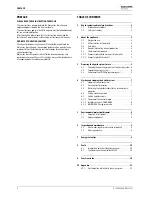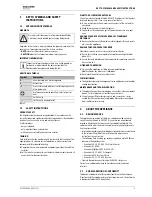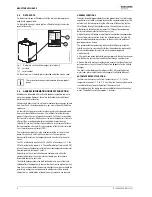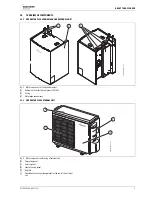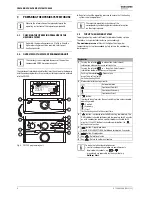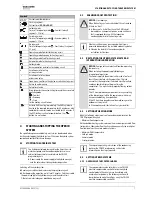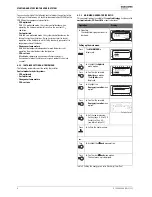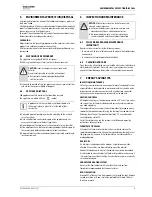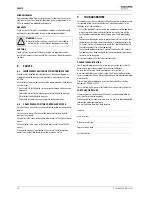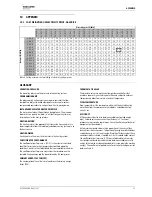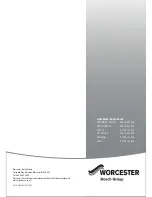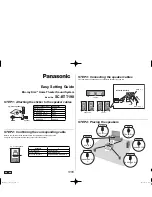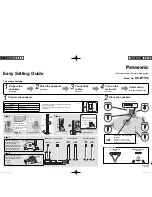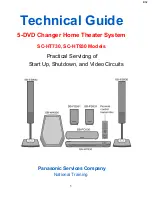
ENVIRONMENTAL PROTECTION/DISPOSAL
6 720 803 688 (2012/11)
9
5
ENVIRONMENTAL PROTECTION/DISPOSAL
Environmental protection is one of the fundamental company policies of
the Bosch Group.
Quality of products, efficiency and environmental protection are equally
important objectives for us. Laws and requirements aimed at protecting
the environment are strictly adhered to.
To protect the environment we will, subject to economical aspects, use
the best possible technology and materials.
PACKAGING
We participate in the recycling programmes of the countries in which our
products are sold to ensure optimum recycling.
All of our packaging materials are environmentally compatible and can
be recycled.
5.1
DISPOSING OF REFRIGERANT
The appliance is charged with R410A refrigerant.
R410A is a greenhouse gas. It must not enter the environment.
▶ If you wish to discard refrigerant, please contact your local authorities
and ask for the correct method of disposal.
5.2
APPLIANCE DISPOSAL
Old appliances contain materials that should be recycled.
The appliance is marked with the
symbol.
▶ Sort and dispose of packaging materials according to the national
recycling system.
▶ Have an authorised contractor dispose of the appliance and any
accessories according to the local regulations.
▶ Do not dispose of the appliance in the normal refuse (e.g. dust bin).
▶ If the appliances have batteries or rechargeable batteries, dispose of
these separately beforehand according to local regulations.
▶ Dispose of electric and electronic equipment separately according to
local requirements.
6
INSPECTION AND MAINTENANCE
6.1
WHAT MAKES REGULAR MAINTENANCE
IMPORTANT?
Regular service is essential for the following reasons:
• to maintain a high level of efficiency and to operate the hybrid system
economically
• to achieve a high level of operational reliability.
6.2
CLEANING AND CARE
Clean the casing of the hybrid manager and the external unit with a damp
cloth (detergent solution). Never use scouring or aggressive cleaning
agents that would damage the painted surface or plastic components.
7
ENERGY SAVING TIPS
INSPECTION/MAINTENANCE
So that gas consumption and environmental impact can be kept as low
as possible for as long as possible, we recommend that you take out an
inspection and maintenance contract with an authorised contractor
covering an annual inspection and service subject to demand.
HEATING CONTROLS
With modern heating systems designed around a 20 °C heat loss across
the system. The system must be balanced correctly and the radiators
may need upgrading.
The temperature of each room can be set individually (except primary
room with the room thermostat) using the thermostatic radiator valves.
Reducing the setting of the room thermostat by 1°C can reduce fuel
consumption by up to 10%.
For further information, see the relevant installation and operating
instructions of the controller.
THERMOSTATIC VALVES
Fully open the thermostatic radiator valves in order to achieve the
required room temperature. Change the required room temperature at
the programming unit only if the temperature is not achieved after a
prolonged period.
RADIATORS
If a radiator is sited underneath a window, its performance will be
affected if the curtains are allowed to drape over the radiator.
Shelves fitted above or in front of the radiator should also be avoided.
It is advisable to manually adjust all thermostatic radiator valves every 2
- 3 months to prevent them sticking. Ensure radiator valves are correctly
set and not damaged.
UNDERFLOOR HEATING SYSTEM
Never set the flow temperature higher than the maximum flow
temperature recommended by the manufacturer.
ROOF INSULATION
Around 30% of the heat loss from a property is through the roof. Replace
any old insulation with new insulation, preferably of around 200mm
thickness or more.
CAUTION:
Incorrect disposal is an environmental
hazard!
Escaping refrigerant damages the environment.
▶ Refrigerant may be disposed of by qualified
contractors only.
Appliances with this symbol may not be disposed of in
the normal refuse (e.g. dust bin) at the end of their
service life.
NOTICE:
Material losses due to a lack of or incorrect
cleaning and maintenance.
▶ Have your hybrid system inspected, serviced and
cleaned annually by an authorised contractor.
▶ We recommend you enter a contract covering an
annual inspection and service subject to demand.


